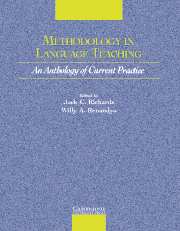Book contents
- Frontmatter
- Contents
- Acknowledgments
- Introduction
- Section I Approaches to Teaching
- Section 2 Lesson Planning and Classroom Management
- Section 3 Classroom Dynamics
- Section 4 Syllabus Design and Instructional Materials
- Section 5 Task and Project Work
- Section 6 Learning Strategies
- Section 7 Teaching Grammar
- Section 8 Teaching Pronunciation
- Section 9 Teaching Speaking
- Section 10 Teaching Listening
- Section 11 Teaching Vocabulary
- Section 12 Teaching Reading
- Section 13 Teaching Writing
- Section 14 Assessment
- Section 15 Technologies in the Classroom
- Section 16 Professional Development
- Credits
- Author Index
- Subject Index
Section 4 - Syllabus Design and Instructional Materials
Published online by Cambridge University Press: 10 November 2010
- Frontmatter
- Contents
- Acknowledgments
- Introduction
- Section I Approaches to Teaching
- Section 2 Lesson Planning and Classroom Management
- Section 3 Classroom Dynamics
- Section 4 Syllabus Design and Instructional Materials
- Section 5 Task and Project Work
- Section 6 Learning Strategies
- Section 7 Teaching Grammar
- Section 8 Teaching Pronunciation
- Section 9 Teaching Speaking
- Section 10 Teaching Listening
- Section 11 Teaching Vocabulary
- Section 12 Teaching Reading
- Section 13 Teaching Writing
- Section 14 Assessment
- Section 15 Technologies in the Classroom
- Section 16 Professional Development
- Credits
- Author Index
- Subject Index
Summary
INTRODUCTION
The processes of curriculum development and syllabus design in language teaching usually involve assessing the needs of learners in a language program, developing goals and objectives, planning a syllabus, selecting teaching approaches and materials, and deciding on assessment procedures and criteria. The papers in this section focus on issues relating to syllabus design and materials development. Since a syllabus reflects a view of language and of language learning, it is not surprising that the nature of language syllabuses has received a great deal of attention in the recent history of language teaching. As communicative approaches to teaching became dominant in the 1980s, attempts have been made to replace grammatical syllabuses with ones that reflect a communicative understanding of language. The move away from grammatically based syllabuses in the 1960s led to a variety of syllabus proposals, including notional-functional, situational, lexical, task-based, and procedural, all of which claim to be examples of a communicative syllabus. Finney examines three major curriculum design models and their origins in underlying educational traditions. She then proposes an integrated, mixed-focus model for curriculum design, within which there is the flexibility to respond to the changing needs of learners and recognition of learners as active participants in the language learning process. The teacher, in this model, is responsible not only for teaching language for communication and language as knowledge, but also for encouraging learners to take responsibility for their own learning so that they develop skills and strategies for continuing to learn outside of the classroom.
- Type
- Chapter
- Information
- Methodology in Language TeachingAn Anthology of Current Practice, pp. 65 - 68Publisher: Cambridge University PressPrint publication year: 2002



